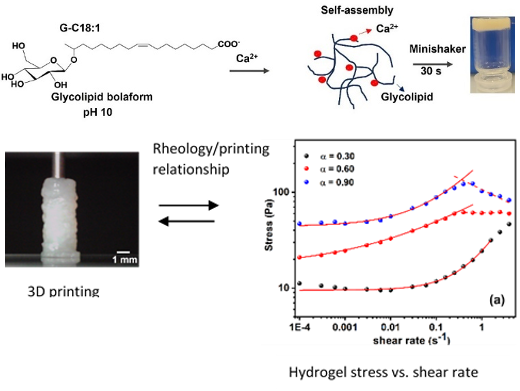- Share
- Share on Facebook
- Share on X
- Share on LinkedIn
Objectives
We aim to create biomimetic matrices capable of supporting cell growth and differentiation through 3D printing. To fully exploit this potential, the key challenge is to formulate suitable hydrogels that combine printability, biocompatibility, and relevant mechanical properties. Natural polymers provide a preferred basis due to their high water retention capacity and good biological tolerance. As shown by our recent results, biosurfactants are emerging as innovative components within this strategy.

Results
Bio-based surfactants, obtained from microbial fermentation, are a class of amphiphilic surfactants with strong potential for biomedical engineering, particularly in the design of biocompatible matrices. However, their use in the fabrication of biocompatible structures by 3D printing has so far remained limited, due to the insufficient adaptability of their rheological properties to extrusion processes.
This work demonstrates that microbial biosurfactants can act as low-molecular-weight gelators, imparting adaptive rheological properties to hydrogels, including shear-thinning behavior, yield stress, thixotropic response, and specific extensional properties.
These features enable controlled extrusion and ensure structural stability after deposition, making these hydrogels particularly suitable for 3D printing. In addition, these hydrogels exhibit sensitivity to external stimuli, especially pH, thereby opening the way to 4D printing applications, where material properties evolve after fabrication. Altogether, these results position biosurfactant-based hydrogels as a sustainable and high-performance platform for the 3D printing of biomedical structures, offering new perspectives in tissue engineering and the development of smart materials.
References
Fragal, E. H., Poirier, A., Bleses, D., Silva, Y. F. G., Baccile, N., & Rharbi, Y. (2025). Microbial biosurfactant hydrogels with tunable rheology for precision 3D printing of soft scaffolds. Soft Matter, 21(22), 4476-4487.
Personnels impliqués
Yahya Rharbi, Didier Bleses
Elizangela Hafemann Fragal (Post-doc)
- Share
- Share on Facebook
- Share on X
- Share on LinkedIn